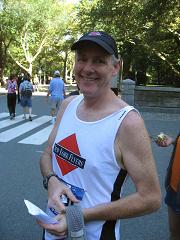Today was my favorite race of the year -- the
5th Avenue Mile. It runs from the Metropolitan Museum to Central Park South, and to me it is a celebration of what it is to be a runner in New York.
The race is run in many heats, separated by gender and age, and at the end features separate races for local elites and international professionals. I love to run this race, but the format also allows me to watch it. I get to see the top runner over 70 break the tape, and I get to watch some of the fastest runners in the world.
I missed last year's race (grrr!), which meant that I had 2 years of training to beat my previous best time. I was pretty sure I could do it, but I really didn't know what to expect. It's the only race under 5K that I run, so how could I know? At the 5th Avenue Mile, that unknown just adds to the fun. My time from 2 years ago was 5:52. This morning, I fired up the McMillan Running Calculator, and entered my best 5K time. Mr. McMillan predicted a time of 5:30 today. It seemed a bit ambitious, but there was only one way to find out.
I met PL at 9AM to jog down to the start, where we picked up our numbers and began spectating. After seeing one group start, we headed to the finish line where the real fun is. It was inspiring to see the younger runners, but soon it was time to jog back up to the start for my heat. There are no corrals for this race, so you just have to guess where you should be standing at the start. Too close to the line, and I would just get run over by faster runners. Too far, and I would get hung up in traffic. Being 49 in the 40-49 heat, I had to be a little conservative.
Before long, the gun went of and we were running. And when I say running, I mean really letting it fly. I was going as fast I would in pretty much any speed workout, and it felt great.
I finished the first quarter in 1:19 -- faster than I can recall ever running that distance. The second quarter, which was uphill came in at 1:27. The third quarter was downhill at 1:22. From there it flattened out, but I felt great, and managed a 1:21 to finish at 5:29, a 23 second PR. Props to the McMillan Running Calculator for nailing my time within one second.
I felt great after the race, and had a blast watching the rest of the heats with fellow Flyers SJ, GM, KM and
NYFlyGirl. We saw TH and PL both PR in the next heat, and all the amazing runners that followed, including awesome performances in the 60-69 and over 70 groups.
Then came the local elites and the pros, who blew us away with their athleticism. Both the men's and women's pro races were down to the wire, with multiple contenders. It was a blast.
Afterward, I put in some easy miles in the park with TH and PL. All in all, a great day.
Next weekend, it's back to running long - November 7 is coming up, and my NYCMarathon mojo is back!






